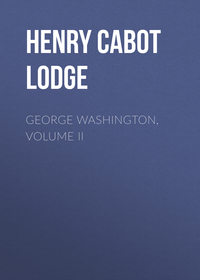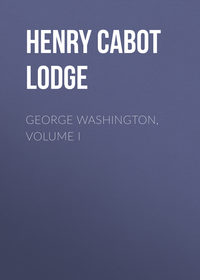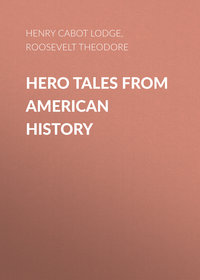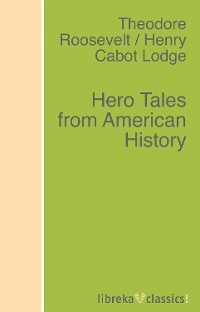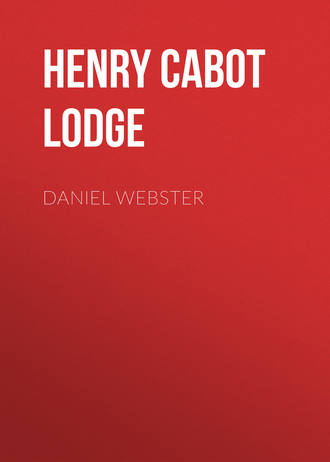 полная версия
полная версияDaniel Webster
This outbreak of feeling was perfectly genuine. Apart from his personal relations to the college, he had the true oratorical temperament, and no man can be an orator in the highest sense unless he feels intensely, for the moment at least, the truth and force of every word he utters. To move others deeply he must be deeply moved himself. Yet at the same time Mr. Webster's peroration, and, indeed, his whole speech, was a model of consummate art. Great lawyer as he undoubtedly was, he felt on this occasion that he could not rely on legal argument and pure reason alone. Without appearing to go beyond the line of propriety, without indulging in a declamation unsuited to the place, he had to step outside of legal points and in a freer air, where he could use his keenest and strongest weapons, appeal to the court not as lawyers but as men subject to passion, emotion, and prejudice. This he did boldly, delicately, successfully, and thus he won his case.
The replies of the opposing counsel were poor enough after such a speech. Holmes's declamation sounded rather cheap, and Mr. Wirt, thrown off his balance by Mr. Webster's exposure of his ignorance, did but slight justice to himself or his cause. March 12th the arguments were closed, and the next day, after a conference, the Chief Justice announced that the court could agree on nothing and that the cause must be continued for a year, until the next term. The fact probably was that Marshall found the judges five to two against the college, and that the task of bringing them into line was not a light one.
In this undertaking, however, he was powerfully aided by the counsel and all the friends of the college. The old board of trustees had already paid much attention to public opinion. The press was largely Federalist, and, under the pressure of what was made a party question, they had espoused warmly the cause of the college. Letters and essays had appeared, and pamphlets had been circulated, together with the arguments of the counsel at Exeter. This work was pushed with increased eagerness after the argument at Washington, and the object now was to create about the three doubtful judges an atmosphere of public opinion which should imperceptibly bring them over to the college. Johnson, Livingston, and Story were all men who would have started at the barest suspicion of outside influence even in the most legitimate form of argument, which was all that was ever thought of or attempted. This made the task of the trustees very delicate and difficult in developing a public sentiment which should sway the judges without their being aware of it. The printed arguments of Mason, Smith, and Webster were carefully sent to certain of the judges, but not to all. All documents of a similar character found their way to the same quarters. The leading Federalists were aroused everywhere, so that the judges might be made to feel their opinion. With Story, as a New England man, a Democrat by circumstances, a Federalist by nature, there was but little difficulty. A thorough review of the case, joined with Mr. Webster's argument, caused him soon to change his first impression. To reach Livingston and Johnson was not so easy, for they were out of New England, and it was necessary to go a long way round to get at them. The great legal upholder of Federalism in New York was Chancellor Kent. His first impression, like that of Story, was decidedly against the college, but after much effort on the part of the trustees and their able allies, Kent was converted, partly through his reason, partly through his Federalism, and then his powers of persuasion and his great influence on opinion came to bear very directly on Livingston, more remotely on Johnson. The whole business was managed like a quiet, decorous political campaign. The press and the party were everywhere actively interested. At first, and in the early summer of 1818, before Kent was converted, matters looked badly for the trustees. Mr. Webster knew the complexion of the court, and hoped little from the point raised in Trustees vs. Woodward. Still, no one despaired, and the work was kept up until, in September, President Brown wrote to Mr. Webster in reference to the argument:—
"It has already been, or shortly will be, read by all the commanding men of New England and New York; and so far as it has gone it has united them all, without a single exception within my knowledge, in one broad and impenetrable phalanx for our defence and support. New England and New York are gained. Will not this be sufficient for our present purposes? If not, I should recommend reprinting. And on this point you are the best judge. I prevailingly think, however, that the current of opinion from this part of the country is setting so strongly towards the South that we may safely trust to its force alone to accomplish whatever is necessary."
The worthy clergyman writes of public opinion as if the object was to elect a President. All this effort, however, was well applied, as was found when the court came together at the next term. In the interval the State had become sensible of the defects of their counsel, and had retained Mr. Pinkney, who stood at that time at the head of the bar of the United States. He had all the qualifications of a great lawyer, except perhaps that of robustness. He was keen, strong, and learned; diligent in preparation, he was ready and fluent in action, a good debater, and master of a high order of eloquence. He was a most formidable adversary, and one whom Mr. Webster, then just at the outset of his career, had probably no desire to meet in such a doubtful case as this.2 Even here, however, misfortune seemed to pursue the State, for Mr. Pinkney was on bad terms with Mr. Wirt, and acted alone. He did all that was possible; prepared himself elaborately in the law and history of the case, and then went into court ready to make the wisest possible move by asking for a re-argument. Marshall, however, was also quite prepared. Turning his "blind ear," as some one said, to Pinkney, he announced, as soon as he took his seat, that the judges had come to a conclusion during the vacation. He then read one of his great opinions, in which he held that the college charter was a contract within the meaning of the Constitution, and that the acts of the New Hampshire Legislature impaired this contract, and were therefore void. To this decision four judges assented in silence, although Story and Washington subsequently wrote out opinions. Judge Todd was absent, through illness, and Judge Duvall dissented. The immediate effect of the decision was to leave the college in the hands of the victorious Federalists. In the precedent which it established, however, it had much deeper and more far-reaching results. It brought within the scope of the Constitution of the United States every charter granted by a State, limited the action of the States in a most important attribute of sovereignty, and extended the jurisdiction of the highest federal court more than any other judgment ever rendered by them. From the day when it was announced to the present time, the doctrine of Marshall in the Dartmouth College case has continued to exert an enormous influence, and has been constantly sustained and attacked in litigation of the greatest importance.
The defendant Woodward having died, Mr. Webster moved that the judgment be entered nunc pro tunc. Pinkney and Wirt objected on the ground that the other causes on the docket contained additional facts, and that no final judgment should be entered until these causes had been heard. The court, however, granted Mr. Webster's motion. Mr. Pinkney then tried to avail himself of the stipulation in regard to the special verdict, that any new and material facts might be added or any facts expunged. Mr. Webster peremptorily declined to permit any change, obtained judgment against Woodward, and obliged Mr. Pinkney to consent that the other causes should be remanded, without instructions, to the Circuit Court, where they were heard by Judge Story, who rendered a decree nisi for the college. This closed the case, and such were the last displays of Mr. Webster's dexterous and vigorous management of the famous "college causes."
The popular opinion of this case seems to be that Mr. Webster, with the aid of Mr. Mason and Judge Smith, developed a great constitutional argument, which he forced upon the acceptance of the court by the power of his close and logical reasoning, and thus established an interpretation of the Constitution of vast moment. The truth is, that the suggestion of the constitutional point, not a very remarkable idea in itself, originated, as has been said, with a layman, was regarded by Mr. Webster as a forlorn hope, and was very briefly discussed by him before the Supreme Court. He knew, of course, that if the case were to be decided against Woodward, it could only be on the constitutional point, but he evidently thought that the court would not take the view of it which was favorable to the college. The Dartmouth College case was unquestionably one of Mr. Webster's great achievements at the bar, but it has been rightly praised on mistaken grounds. Mr. Webster made a very fine presentation of the arguments mainly prepared by Mason and Smith. He transcended the usual legal limits with a burst of eloquent appeal which stands high among the famous passages of his oratory. In what may be called the strategy of the case he showed the best generalship and the most skilful management. He also proved himself to be possessed of great tact and to be versed in the knowledge of men, qualities not usually attributed to him because their exercise involved an amount of care and painstaking foreign to his indolent and royal temperament, which almost always relied on weight and force for victory.
Mr. Webster no doubt improved in details, and made better arguments at the bar than he did upon this occasion, but the Dartmouth College case, on the whole, shows his legal talents so nearly at their best, and in such unusual variety, that it is a fit point at which to pause in order to consider some of his other great legal arguments and his position and abilities as a lawyer. For this purpose it is quite sufficient to confine ourselves to the cases mentioned by Mr. Curtis, and to the legal arguments preserved in the collection of Mr. Webster's speeches.
Five years after the Dartmouth College decision, Mr. Webster made his famous argument in the case of Gibbons vs. Ogden. The case was called suddenly, and Mr. Webster prepared his argument in a single night of intense labor. The facts were all before him, but he showed a readiness in arrangement only equalled by its force. The question was whether the State of New York had a right under the Constitution to grant a monopoly of steam navigation in its waters to Fulton and Livingston. Mr. Webster contended that the acts making such a grant were unconstitutional, because the power of Congress to regulate commerce was, within certain limitations, exclusive. He won his cause, and the decision, from its importance, probably enhanced the contemporary estimate of his effort. The argument was badly reported, but it shows all its author's strongest qualities of close reasoning and effective statement. The point in issue was neither difficult nor obscure, and afforded no opportunity for a display of learning. It was purely a matter of constitutional interpretation, and could be discussed chiefly in a historical manner and from the standpoint of public interests. This was particularly fitted to Mr. Webster's cast of mind, and he did his subject full justice. It was pure argument on general principles. Mr. Webster does not reach that point of intense clearness and condensation which characterized Marshall and Hamilton, in whose writings we are fascinated by the beauty of the intellectual display, and are held fast by each succeeding line, which always comes charged with fresh meaning. Nevertheless, Mr. Webster touches a very high point in this most difficult form of argument, and the impressiveness of his manner and voice carried all that he said to its mark with a direct force in which he stood unrivalled.
In Ogden v. Saunders, heard in 1827, Mr. Webster argued that the clause prohibiting state laws impairing the obligation of contracts covered future as well as past contracts. He defended his position with astonishing ability, but the court very correctly decided against him. The same qualities which appear in these cases are shown in the others of a like nature, which were conspicuous among the multitude with which he was intrusted. We find them also in cases involving purely legal questions, such as the Bank of the United States v. Primrose, and The Providence Railroad Co. v. The City of Boston, accompanied always with that ready command of learning which an extraordinary memory made easy. There seemed to be no diminution of Mr. Webster's great powers in this field as he advanced in years. In the Rhode Island case and in the Passenger Tax cases, argued when he was sixty-six years old, he rose to the same high plane of clear, impressive, effective reasoning as when he defended his Alma Mater.
Two causes, however, demand more than a passing mention,—the Girard will case and the Rhode Island case. The former involved no constitutional points. The suit was brought to break the will of Stephen Girard, and the question was whether the bequest to found a college could be construed to be a charitable devise. On this question Mr. Webster had a weak case in point of law, but he readily detected a method by which he could go boldly outside the law, as he had done to a certain degree in the Dartmouth College case, and substitute for argument an eloquent and impassioned appeal to emotion and prejudice. Girard was a free-thinker, and he provided in his will that no priest or minister of any denomination should be admitted to his college. Assuming that this excluded all religious teaching, Mr. Webster then laid down the proposition that no bequest or gift could be charitable which excluded Christian teaching. In other words, he contended that there was no charity except Christian charity, which, the poet assures us, is so rare. At this day such a theory would hardly be gravely propounded by any one. But Mr. Webster, on the ground that Girard's bequest was derogatory to Christianity, pronounced a very fine discourse defending and eulogizing, with much eloquence, the Christian religion. The speech produced a great effect. One is inclined to think that it was the cause of the court's evading the question raised by Mr. Webster, and sustaining the will, a result they were bound to reach in any event, on other grounds. The speech certainly produced a great sensation, and was much admired, especially by the clergy, who caused it to be printed and widely distributed. It did not impress lawyers quite so favorably, and we find Judge Story writing to Chancellor Kent that "Webster did his best for the other side, but it seems to me altogether an address to the prejudices of the clergy." The subject, in certain ways, had a deep attraction for Mr. Webster. His imagination was excited by the splendid history of the Church, and his conservatism was deeply stirred by a system which, whether in the guise of the Romish hierarchy, as the Church of England, or in the form of powerful dissenting sects, was, as a whole, imposing by its age, its influence, and its moral grandeur. Moreover, it was one of the great established bulwarks of well-ordered and civilized society. All this appealed strongly to Mr. Webster, and he made the most of his opportunity and of his shrewdly-chosen ground. Yet the speech on the Girard will is not one of his best efforts. It has not the subdued but intense fire which glowed so splendidly in his great speeches in the Senate. It lacked the stately pathos which came always when Mr. Webster was deeply moved. It was delivered in 1844, and was slightly tinged with the pompousness which manifested itself in his late years, and especially on religious topics. No man has a right to question the religious sincerity of another, unless upon evidence so full and clear that, in such cases, it is rarely to be found. There is certainly no cause for doubt in Mr. Webster's case. He was both sincere and honest in religion, and had a real and submissive faith. But he accepted his religion as one of the great facts and proprieties of life. He did not reach his religious convictions after much burning questioning and many bitter experiences. In this he did not differ from most men of this age, and it only amounts to saying that Mr. Webster did not have a deeply religious temperament. He did not have the ardent proselyting spirit which is the surest indication of a profoundly religious nature; the spirit of the Saracen Emir crying, "Forward! Paradise is under the shadow of our swords." When, therefore, he turned his noble powers to a defence of religion, he did not speak with that impassioned fervor which, coming from the depths of a man's heart, savors of inspiration and seems essential to the highest religious eloquence. He believed thoroughly every word he uttered, but he did not feel it, and in things spiritual the heart must be enlisted as well as the head. It was wittily said of a well-known anti-slavery leader, that had he lived in the Middle Ages he would have gone to the stake for a principle, under a misapprehension as to the facts. Mr. Webster not only could never have misapprehended facts, but, if he had flourished in the Middle Ages he would have been a stanch and honest supporter of the strongest government and of the dominant church. Perhaps this defines his religious character as well as anything, and explains why the argument in the Girard will case, fine as it was, did not reach the elevation and force which he so often displayed on other themes.
The Rhode Island case grew out of the troubles known at that period as Dorr's rebellion. It involved a discussion not only of the constitutional provisions for suppressing insurrections and securing to every State a republican form of government, but also of the general history and theory of the American governments, both state and national. There was thus offered to Mr. Webster that full scope and large field in which he delighted, and which were always peculiarly favorable to his talents. His argument was purely constitutional, and although not so closely reasoned, perhaps, as some of his earlier efforts, is, on the whole, as fine a specimen as we have of his intellectual power as a constitutional lawyer at the bar of the highest national tribunal. Mr. Webster did not often transcend the proper limits of purely legal discussion in the courts, and yet even when the question was wholly legal, the court-room would be crowded by ladies as well as gentlemen, to hear him speak. It was so at the hearing of the Girard suit; and during the strictly legal arguments in the Charles River Bridge case, the court-room, Judge Story says, was filled with a brilliant audience, including many ladies, and he adds that "Webster's closing reply was in his best manner, but with a little too much fierté here and there." The ability to attract such audiences gives an idea of the impressiveness of his manner and of the beauty of his voice and delivery better than anything else, for these qualities alone could have drawn the general public and held their attention to the cold and dry discussion of laws and constitutions.
There is a little anecdote told by Mr. Curtis in connection with this Rhode Island case, which illustrates very well two striking qualities in Mr. Webster as a lawyer. The counsel in the court below had been assisted by a clever young lawyer named Bosworth, who had elaborated a point which he thought very important, but which his seniors rejected. Mr. Bosworth was sent to Washington to instruct Mr. Webster as to the cause, and, after he had gone through the case, Mr. Webster asked if that was all. Mr. Bosworth modestly replied that there was another view of his own which his seniors had rejected, and then stated it briefly. When he concluded, Mr. Webster started up and exclaimed, "Mr. Bosworth, by the blood of all the Bosworths who fell on Bosworth field, that is the point of the case. Let it be included in the brief by all means." This is highly characteristic of one of Mr. Webster's strongest attributes. He always saw with an unerring glance "the point" of a case or a debate. A great surgeon will detect the precise spot where the knife should enter when disease hides it from other eyes, and often with apparent carelessness will make the necessary incision at the exact place when a deflection of a hair's breadth or a tremor of the hand would bring death to the patient. Mr. Webster had the same intellectual dexterity, the mingled result of nature and art. As the tiger is said to have a sure instinct for the throat of his victim, so Mr. Webster always seized on the vital point of a question. Other men would debate and argue for days, perhaps, and then Mr. Webster would take up the matter, and grasp at once the central and essential element which had been there all along, pushed hither and thither, but which had escaped all eyes but his own. He had preëminently
"The calm eye that seeks 'Midst all the huddling silver little worth The one thin piece that comes, pure gold."The anecdote further illustrates the use which Mr. Webster made of the ideas of other people. He did not say to Mr. Bosworth, here is the true point of the case, but he saw that something was wanting, and asked the young lawyer what it was. The moment the proposition was stated he recognized its value and importance at a glance. He might and probably would have discovered it for himself, but his instinct was to get it from some one else.
It is one of the familiar attributes of great intellectual power to be able to select subordinates wisely; to use other people and other people's labor and thought to the best advantage, and to have as much as possible done for one by others. This power of assimilation Mr. Webster had to a marked degree. There is no depreciation in saying that he took much from others, for it is a capacity characteristic of the strongest minds, and so long as the debt is acknowledged, such a faculty is a subject for praise, not criticism. But when the recipient becomes unwilling to admit the obligation which is no detraction to himself, and without which the giver is poor indeed, the case is altered. In his earliest days Mr. Webster used to draw on one Parker Noyes, a mousing, learned New Hampshire lawyer, and freely acknowledged the debt. In the Dartmouth College case, as has been seen, he over and over again gave simply and generously all the credit for the learning and the points of the brief to Mason and Smith, and yet the glory of the case has rested with Mr. Webster and always will. He gained by his frank honesty and did not lose a whit. But in his latter days, when his sense of justice had grown somewhat blunted and his nature was perverted by the unmeasured adulation of the little immediate circle which then hung about him, he ceased to admit his obligations as in his earlier and better years. From no one did Mr. Webster receive so much hearty and generous advice and assistance as from Judge Story, whose calm judgment and wealth of learning were always at his disposal. They were given not only in questions of law, but in regard to the Crimes Act, the Judiciary Act, and the Ashburton treaty. After Judge Story's death, Mr. Webster not only declined to allow the publication by the judge's son and biographer of Story's letters to himself, but he refused to permit even the publication of extracts from his own letters, intended merely to show the nature of the services rendered to him by Story. A cordial assent would have enhanced the reputation of both. The refusal is a blot on the intellectual greatness of the one and a source of bitterness to the descendants and admirers of the other. It is to be regretted that the extraordinary ability which Mr. Webster always showed in grasping and assimilating masses of theories and facts, and in drawing from them what was best, should ever have been sullied by a want of gratitude which, properly and freely rendered, would have made the lustre of his own fame shine still more brightly.
A close study of Mr. Webster's legal career, in the light of contemporary reputation and of the best examples of his work, leads to certain quite obvious conclusions. He had not a strongly original or creative legal mind. This was chiefly due to nature, but in some measure to a dislike to the slow processes of investigation and inquiry which were always distasteful to him, although he was entirely capable of intense and protracted exertion. He cannot, therefore, be ranked with the illustrious few, among whom we count Mansfield and Marshall as the most brilliant examples, who not only declared what the law was, but who made it. Mr. Webster's powers were not of this class, but, except in these highest and rarest qualities, he stands in the front rank of the lawyers of his country and his age. Without extraordinary profundity of thought or depth of learning, he had a wide, sure, and ready knowledge both of principles and cases. Add to this quick apprehension, unerring sagacity for vital and essential points, a perfect sense of proportion, an almost unequalled power of statement, backed by reasoning at once close and lucid, and we may fairly say that Mr. Webster, who possessed all these qualities, need fear comparison with but very few among the great lawyers of that period either at home or abroad.


